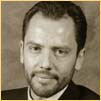| Sun | Mon | Tue | Wed | Thu | Fri | Sat |
|---|---|---|---|---|---|---|
| 1 | 2 | 3 | 4 | 5 | ||
| 6 | 7 | 8 | 9 | 10 | 11 | 12 |
| 13 | 14 | 15 | 16 | 17 | 18 | 19 |
| 20 | 21 | 22 | 23 | 24 | 25 | 26 |
| 27 | 28 | 29 | 30 | 31 |
CATEGORIES
RECENT ENTRIES
BLOG ROLL
Religion makes economic sense

|
As bowls of salad and balsamic dressing get passed around the cafeteria-style tables in Swift Common Room, the lunchtime group members, mostly Divinity School professors and students, make introductions, joking and guessing each other’s denominations.
It sounds like typical banter at the Div School’s Wednesday lunch series. Less commonplace within these walls, however, is the talk’s topic: economics. Which is why speaker Luigi Zingales, abandoning his $4 vegetarian meal to discuss religion’s impact on economic attitudes, concedes up front: Religion “is not our area of expertise. We should give up.”
The admission earns laughs before Zingales, the Robert C. McCormack professor of entrepreneurship and finance, continues, explaining his team’s approach: “Mostly we can draw correlations.” Using data from the World Values Survey, a collection of questionnaires on values and beliefs, the researchers examined attitudes toward equality and incentives, private and government ownership, and competition. They even found some links between religiosity and support of the free-market system.
Religion, he argues, is good for economic development, meaning churchgoers are generally more promarket. Among religions, he says, Muslims are more pro-state and antimarket; Christians and Buddhists are less pro-state and more promarket.
While Zingales calls the level of interest in the study “overwhelming,” he has moved on to new projects, including a look at cultural biases in economic exchange. Further analysis of the religion findings will have to wait. “Actually,” he says to the crowd of 50, “this is more for you guys to do.”
M.L.
October 8, 2004
